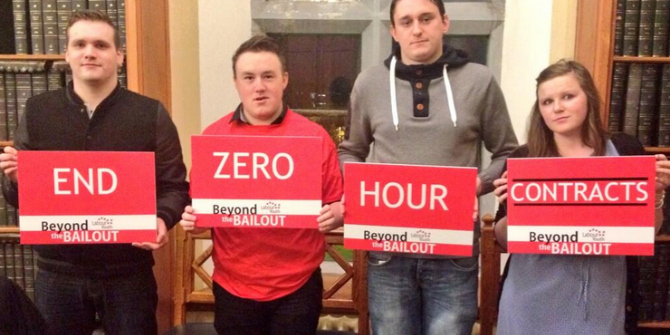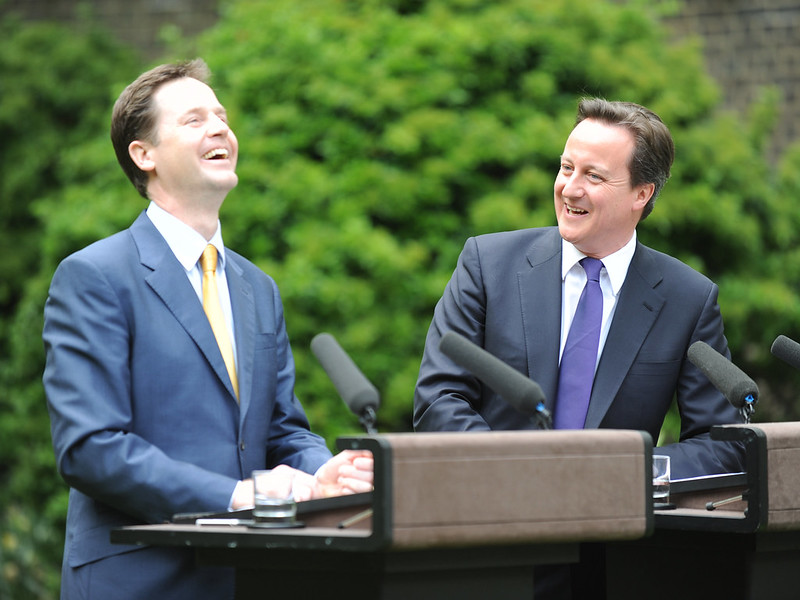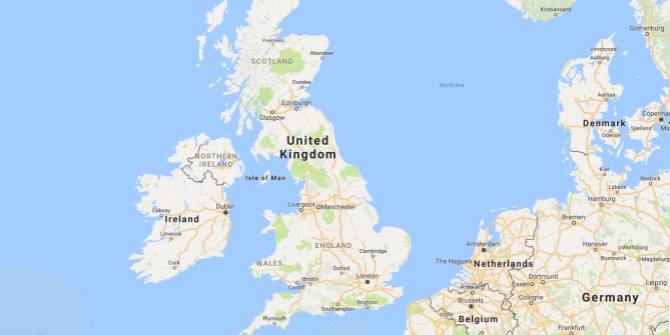 Rather than enact policies to reduce inflated housing prices which many are calling for, the government is doing everything in its power to prop up prices. Frances Coppola argues that this is not surprising given that housing policy is not only highly political but also because a fall in prices would be disastrous for mortgage lenders and the economy in general at the moment.
Rather than enact policies to reduce inflated housing prices which many are calling for, the government is doing everything in its power to prop up prices. Frances Coppola argues that this is not surprising given that housing policy is not only highly political but also because a fall in prices would be disastrous for mortgage lenders and the economy in general at the moment.
House prices in the UK are too high. How much too high they are depends on where you are: house prices have been rising in London because rich Asian businessmen and French aristocrats are buying up prime real estate as a safe haven investment for their filthy lucre, apparently. But outside London and the South East, house prices have actually fallen over the last few years, a bit. But not much. Certainly not enough to make them affordable for young people on median incomes.
The trouble is, there are a lot of people out there who already own houses. Many of them are relying on the value of their property to top-up their pensions. And all of them have votes. The total voting power of homeowners in the UK far exceeds that of the young people who are being priced out of the housing market. It would be electoral suicide at the moment for any political party to sign up to policies that would cause a significant fall in house prices.
However, there is future electoral benefit in making it possible for young people to buy houses. At some point many of these elderly property-owners are going to want to sell their houses, and if young people can’t afford them then they are in for a big shock. It is not in older homeowners’ interests to sit on an appreciating asset whose value is not realisable in practice. Writing down the value to something more affordable is a far more sensible strategy for older homeowners who have paid off their mortgages. Young people and old people therefore have more in common than they think they do. The people who really stand to lose from a major fall in house prices are those with mortgages, particularly those who over-borrowed prior to the financial crisis and are only just managing to service their debts. A fall in house prices could force many of these into negative equity. Painful though that would be, it would enable the housing market to readjust to a more sustainable level, and provided interest rates remained low, borrowers would be able to continue to service their loans. Yes, a lot of young families would be trapped in houses too small for them because the amount of their mortgage exceeded the value of the house – as I was in the early 1990s, the last time there was a significant house price correction in the UK. But repayment mortgages are forgiving things: eventually the outstanding amount would drop below the house value and they would be able to move.
So engineering a fall in house prices looks like a good economic strategy for the medium-term, although possibly not a wise one for politicians hoping to get re-elected in 2015. But the Government is not even discussing it. On the contrary, it is doing everything in its power to prop up house prices. It is not liberalising planning laws to enable expansion of private sector building programmes, as some have suggested. Nor is it sponsoring public sector building programmes. And on the monetary side, it now has two schemes designed to make it easier for first-time buyers – the Funding for Lending Scheme, which provides cheap funding to banks on condition that they lend more to house-buyers and small businesses, and the Help to Buy scheme, which guarantees part of the purchase price of a house, thus making it possible for people to buy a house without much in the way of a deposit. Both of these schemes have been criticised for potentially increasing house prices.
This apparent short-termism is not entirely due to electoral considerations, though those are clearly a factor. A fall in house prices is not the easy solution it appears to be. In fact at the moment it would have disastrous effects on the economy. The reason is, of course, banks. And building societies. And indeed any financial institution that lends against property.
House price falls are disastrous for mortgage lenders. Mortgages are secured loans: the house that is bought is the collateral for the loan, and the loan is granted on the basis of the value of that collateral. As with all forms of secured lending, the value of the collateral usually exceeds the amount of the loan: the difference is made up with the house-buyer’s own funds. Since the financial crisis mortgage lenders have reduced their loan-to-value (LTV) ratios considerably, which has made it very hard for house-buyers with limited resources to find the money needed for deposits (this is the stated justification for the Government’s Help to Buy scheme). Good quality loans typically have a LTV ratio of less than 80%: the risk associated with the loan increases as the LTV approaches 100%. Above 100%, part of the loan is effectively unsecured. Without going into details about how bank capital ratios work, the higher the LTV, the greater the amount of bank capital required to support it, more-or-less. When house prices fall, LTV values rise – exceeding 100% for borrowers in negative equity. Falling house prices therefore eat up banks’ capital, not because they took on risky loans but because their supposedly safe low-LTV mortgages become much riskier. Banks and building societies are already damaged from the financial crisis of 2007-8. A large fall in house prices could bankrupt many of them. Particularly at risk would be building societies and small retail banks, who tend to have lower capital levels than large universal banks because most of their lending is in supposedly “safe” mortgages. There is nothing “safe” about mortgage lending in an overblown and fragile housing market.
Improving the supply of houses without causing a major fall in house prices seems to be almost impossible. An extensive private sector house building programme would help the recession-hit construction sector, but it would force down house prices. That would apply whether those houses were for sale or for rent. Landlords borrow to finance the purchase of homes for renting out, and they carry the value of their rental properties on their balance sheets: and as rents tend to be set in relation to house prices, falling house prices would be likely to force rental values down. A major fall in house prices would therefore potentially bankrupt many landlords. And construction companies who borrow on the basis of expected returns could also be bankrupted if those returns fail to materialise because of falling prices. This is what happened in Ireland.
A social house-building programme similar to that after World War II might improve the supply of homes for rent without causing house prices to fall. Or it might not, if the effect was that people who might otherwise have tried to buy substituted into new social housing. And what if those houses were then sold to their tenants under the Right to Buy scheme? This would also cause house prices to fall, though perhaps more slowly than large-scale private sector house-building. Of all the options for improving the supply of housing without wrecking the financial sector, this looks the best. But it would require government not only to spend money, thereby increasing the fiscal deficit, but to abandon its ideological commitment to private-sector solutions and admit that we need an increased role for publicly-owned housing at the moment. I suspect hell would freeze over first.
So forcing a house price correction would have horrible effects on the economy at the moment. But for many people, housing is at the limits of affordability. The rise in the price of houses in the last two decades has far outstripped incomes, which have actually stagnated in the last ten years. Low interest rates have encouraged people to take on mortgages that stretch them financially. A rise in interest rates would force many people into defaulting on mortgages or other loans, which would also have a serious impact on the financial sector. A sudden rise in unemployment would have similar effects. And as real incomes decline due to below-inflation pay rises, benefit cuts, tax rises and underemployment, more and more people are becoming financially overstretched. They don’t default on their mortgages, but they cut spending in other areas. This depresses demand for goods and services in the economy, forcing companies to cut costs – which usually involves reducing jobs and/or wages – and even go out of business. It is a moot question whether the real problem here is low pay or high inflation: perhaps it is a bit of both. But the solution is not easy. Raising interest rates to counter inflationary pressures would cause financial distress to many households and businesses. Raising wages without an equivalent rise in GDP would be likely to create higher unemployment. And raising real incomes through higher benefits and/or cutting taxes would increase the fiscal deficit.
So we cannot force down house prices, we cannot force up real incomes and we cannot vastly increase the fiscal deficit. The housing conundrum resembles one of those games of the “there’s a hole in my bucket” variety – a mind puzzle, if you like. Many people solve it by leaving out some of the pieces – which of course is not a solution at all. Others want to do something dramatic such as a large rise in interest rates or a massive state-funded construction programme to “shock” the system into correcting – the idea being that the short-term pain would be worth it to achieve a sustainable correction. I understand their frustration, but I am not sympathetic to their solution. This Gordian knot cannot be simply cut with a sword. It must be painstakingly unpicked – and I fear that will take a very long time.
This article was originally published on Frances Coppola’s blog, Coppola Comment.
Note: This article gives the views of the author, and not the position of the British Politics and Policy blog, nor of the London School of Economics. Please read our comments policy before posting.
Frances Coppola has an MBA from Cass Business School. She designed risk management systems for Treasury and Capital Markets at NatWest, and a group consolidated financial & regulatory reporting system for RBS Group. She writes on her Coppola Comment blog and is also the author of the Singing is Easy blog, where she writes about singing, teaching and musical expression. She tweets from @Frances_Coppola.








Please read my commet below as Professor Steve Keen does have a positive way out of this mess, but unfortunately; it is not being discussed. He was interviewed on BBC HardTalk a few months ago and discussed his proposal.
It would be interesting to see Paul Krugman and Steve Keen on BBC Newsnight to debate this issue.
Professor Steve Keen proposed a solution that would help both Debtors and Savers.
A debt jubilee would be QE for the public, providing a cash payment to everyone with the condition that they use it to pay down any debts first. This would help savers, as their savings would increase and they would be encouraged to spend into the economy, and debtors would reduce their debt. House Prices could be maintained as their would be more cash in the System. But Bank lending practices would have to change inorder to prevent another Housing Boom. Banks would be restricted to lend against a Properties Rentable value, propective buyers would have to bid up their deposit and not the property price, this would encourage saving and reduce debt.
The governments Help to Buy Scheme and Funding for Lending Scheme is only going to create a new Bubble in Asset Prices and creating more opportunites for people to get into unsustainable debt. The very cause of the Financial Crisis in the first place.
A Debt Jubilee would correct the whole system and bring down the level of debt. Why is Steve Keen’s proposal not getting wider discussion amongst Politicians?
It’s a shame, but we know there are no quick fixes to this sort of problem. Unfortunately, while reducing costs and interest would make it easier for buyers, as you said, it would be financially problematic to the country, while failing to reduce costs makes it harder for people to buy. While this problem is going on, the same people are buying up property to rent at extortianate prices, meaning that the people who may have, at some point, earned enough to eventually get them on the property ladder, will no doubt struggle immensely to do that. The rents have become so high, especially in the capital, that people aren’t earning enough to save money for deposits on top of their monthly rent – especially with the job market (especially for young people) being the way it is.
It’s pessimistic, but I just don’t see a successful way out of this mess…
How about we don’t force house prices down and we don’t prop them up either.
You seem to be arguing that we should do nothing about a housing shortage because that would mean prices would fall. Surely that would boost affordability for first time buyers, saddle them with less debt and move back towards a healthy property market instead of one propped up by Buy-to-let landlords, leveraged and subsidised by Govt schemes like help to buy.
If the solution to the crisis is some transfer of wealth from savers to debtors then allowing housing to correct naturally has to be a good way to achieve it.
Can I suggest you read what I said a little more carefully? I have not suggested doing nothing. I said that causing a major fall in house prices at the moment would be disastrous for the economy because of its effect on already damaged banks. But I did indicate that a slow managed decline in house prices would be sensible.
The “unpicking” to which you refer seems to me not worth hoping for with the kind of government we have now: they are so firmly on the side of banks, those with wealth and landlords. It’s not just ideology but material interest.
It’s necessary to think what might be achievable with other kinds of government. It’s also necessary, in my view, to think more dynamically about housing and land prices: what attracts people into excessive amounts of house purchase – to occupy or to let – is the expectation of escalation in prices and/or rents and it is that expectation which has to be ended. It could be managed through a variety of announcements and measures designed to stabilise prices. (It’s for discussion whether this goal should be for a real-terms stability or a money-terms stability.) I put some suggested instruments online last week in response to a Twitter exchange between you and econgirl in a German context here.
Meanwhile I support your plea for large scale social housing production. And there are other possibilities too. 1. The homes which have been repossessed by the banks which we bailed out should immediately become social housing units; 2. Those who get into critical arrears on mortgage payments—and as you say they could multiply fast if interest rates rise—should have a “right to rent”, becoming tenants of the homes in which they live.
I’m a bit surprised to see you treating public sector borrowing as an unquestioned constraint on direct public house building since you are normally arguing that private debt is a much greater problem in the UK. For those who panic about PSBR I suggest that the construction cost part of housing production be excluded from PSBR. This would concentrate everyone’s minds on getting and prices down – for example by switching to existing use value as the basis for compulsory purchase.
“[W]hat attracts people into excessive amounts of house purchase – to occupy or to let – is the expectation of escalation in prices and/or rents and it is that expectation which has to be ended.”
The best way of doing that is to make it easy AND SAFE for people to save for their old age, or a time when they are otherwise unable to work for a living so that they do not have to make do on basic state benefits alone. So that would, in my view, entail things like ending (or at least significantly loosening) means testing of benefits, not running an inflationary economic policy, and guaranteeing the growth and safety of pensions and annuities (e.g. by not indulging in windfall taxing of funds when they seem ripe for picking).
I’m not a pensions expert but fully agree that lack of confidence in pensions must be one of the factors driving people into (excess) house-purchase—and probably into other forms of speculation on asset-price growth. My perspective is to look for ways of making productive investment more attractive to savers than the chasing of asset prices. The big pension problem, in my view, is that the UK opted for a funded approach to pensions in which my retirement income depends on the profitability of capitalism and (if annuities are involved) low inflation. We would have done much better to have pensions based on direct transfers from current national income (current production) to the deferred incomes of pensioners.
Hi Michael,
Like most people you don’t in my view give sufficient weight to the effects of house price falls on the financial industry. Since the banking sector is already fragile, a major property market correction at the moment would wreck it. My objection to allowing this to happen stems not from any desire to see banks bailed out, but from my understanding of the appalling effect a major banking system failure would have on the UK economy. We have already had five years of economic pain due to the near-failure of our banking system in 2008, and this could well be much worse. If you want to see what it might look like, just watch Cyprus over the coming year. Cyprus has forecast GDP contraction THIS YEAR of 8-13% depending on whether or not exports hold up. And that will be followed by further contraction in 2014 and 2015. Optimistic forecasts are for a 20% fall in GDP in two years, and it could well be more. Because financial services are still very dominant in the UK economy just as they have been in Cyprus, that’s the sort of GDP collapse we could be looking at if we allowed our banking system (including building societies) to fail because of a US-style house price correction.
The public borrowing constraint is political, not economic. I do indeed think that private debt is a much bigger problem than public debt in the UK. The government currently has the lowest borrowing costs in history. It can and should be borrowing now to invest for the future – as the IMF has just said. That investment could include social housing.
Although I agree that the public borrowing constraint is purley poitical and not economic (as it wasn’t public debt that caused the 2008 Financial Crisis – it was Private Debt, as you rightly imply), we must address the issue of Public Created Money (3% of the money supply) and Private Financial Institution created money (97%).
In 1968, public created money amounted to around 17%. The Capital Reserve Ratio for Banks – enforced by the Government, was 20.5%. Now the amount of publicly created money is 3%, and the Capital Reserve Requirement enforced by Government is ZERO%. This is primarily the reason why the Private and Public sectors are so dependent on debt and is the reason why the Government is promoting Help to Buy and Funding for Lending because someone in Government knows that without debt (with ever increasing interest repayments) the economy will collapse with lack of “Money” or Debt.
The solution to this problem is to reverse this process and head towards a money supply that has a greater proportion of Publicly created (debt free) money while at the same time reducing the amount of Interest bearing money which is created by Banks when they lend, and destroyed by Banks when the loans are repayed.
Its about the Quantity of Money in the System and how it is created and who creates it. Once we learn this, the solution becomes obvious.